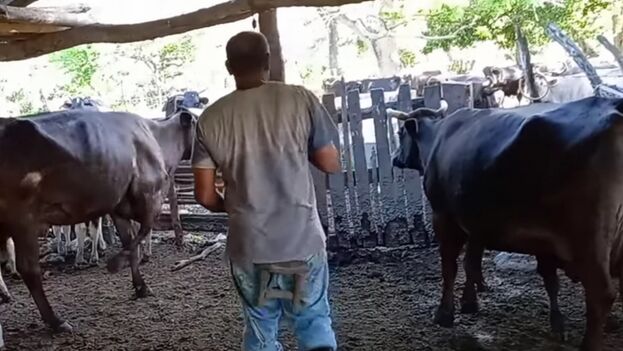
![]() 14ymedio, Havana, 20 December 2022 — The Ciego de Ávila farmers stand firm and prefer to pay the State the 10-peso fine per gallon of undelivered milk before selling it to them. This is confessed by Leonardo Pérez Rodríguez, sub-delegate of Livestock in the provincial delegation of Agriculture, who recognizes serious problems in contracting with producers. A few days before the beginning of 2023, only 33% of the milk has been contracted, and “over 2 billion gallons are still missing.”
14ymedio, Havana, 20 December 2022 — The Ciego de Ávila farmers stand firm and prefer to pay the State the 10-peso fine per gallon of undelivered milk before selling it to them. This is confessed by Leonardo Pérez Rodríguez, sub-delegate of Livestock in the provincial delegation of Agriculture, who recognizes serious problems in contracting with producers. A few days before the beginning of 2023, only 33% of the milk has been contracted, and “over 2 billion gallons are still missing.”
The year 2022 has not ended well in the province, according to the authorities, who put the milk deficit at 8.5 million. “We are going to deliver more than 1.5 million compared to 2021; however, this doesn’t comply with what was agreed in 2022, which was higher,” he says.
Osvaldo Morales Batista, director of the Dairy in Ciego de Ávila, explains that in the northern area, which usually delivers the greatest amount of milk, “the cars are practically empty.”
According to his calculations, the vehicles arrive with approximately 4,755 gallons – although in recent weeks they have been transporting only 2,906 — barely enough to cover medical diets, which demand 3,963. “What would be left for the delivery to children under seven years old?” rhetorically asks the text of Invasor, which discusses the situation.
The article notes that already in May one could see the situation coming, when the commercial director of the Dairy, Yulema Yero Pérez de Corcho, explained that with the only 8,982 gallons per day they obtained it was not possible to fulfill all the orders. At that time, Sancti Spíritus was sending between 2,642 and 5,283 gallons because of not being able to process the milk because of “problems in his industry.” Since then, the situation has worsened.
Morales Batista adds that Ciego de Ávila is receiving milk from other parts of the country, which he did not specify, and that he could try to cover the demand with imported powdered milk, but the situation “is not sustainable.” Between 2015 and 2019, the Island spent more than 600 million dollars on milk powder, a product that is imported mainly from New Zealand (whole milk) and Belgium (skimmed).
Although the authorities point to the drought as one of the reasons the amount of milk delivered decreased, even they do not hide that the root lies in the displeasure of farmers with the State. Misleidy Abad Modey, the first secretary of the Party in Majagua, asks for “sincere exchanges” after the Dairy let three months of debts accumulate with the farmers.
In the contracting, they point out, they have seen how there are “farmers who have gotten up and left, others who have not attended the call in their productive base, even those who have proposed in advance, with total naturalness, to pay the industry the 10 pesos for each undelivered gallon to be able to dispose of production.”
The newspaper affirms that the director of the Dairy reported these events “astounded” him, although he admits that it is a great stimulus to be able to sell each gallon on the informal market at 100 pesos, obtaining a profit ten times higher.
The worst thing, in any case, is the recognition that there is no proposal to improve the situation. Nexy Véliz Naranjo, a member of the Provincial Bureau of the Communist Party, affirms that it is mandatory to comply with the plan, since the State delivered the land in exchange for production, but at the same time assumes that, “even rescinding the possession of the land, it is not guaranteed that, wherever those cows go, each one contributes their 2.5 daily liters of milk.”
The problem that Invasor addresses today occurs at the national level, as 14ymedio noted in a report published on December 11. In the article, a producer of Camajuaní, Bruno, reported that the majority of farmers he knows deliver 80% of the production to the plan and sell the rest in the informal market to make profits and pay the fine. “That doesn’t fail,” he said, “but we’ll have to see how long it lasts.”
In the text, several farmers in the area commented on the problems they face in complying with contracts that require more than can be given with the current resources and the money that the State offers, not counting non-payments. For this reason, many are leaving the sector or investing what they have in others that are less controlled, which will reduce the supply of milk. Cutting off the nose to spite the face.
Translated by Regina Anavy
____________
COLLABORATE WITH OUR WORK: The 14ymedio team is committed to practicing serious journalism that reflects Cuba’s reality in all its depth. Thank you for joining us on this long journey. We invite you to continue supporting us by becoming a member of 14ymedio now. Together we can continue transforming journalism in Cuba.
